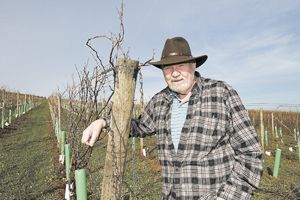Q&A with Dick Erath

By Karl Klooster
When it comes to the truth of the matter about any human endeavor, nothing beats having been there. Over the five years from 1965 through 1969, you could count all those involved in Oregon’s wine industry on one hand. And Dick Erath was one of them.
He came to the Yamhill Valley in 1967. Only Charles Coury, David Lett and their wives were already there, tending some very young vines and looking forward to the day when they could actually begin making a few barrels of wine.
The only other person on the Oregon wine scene at the time was trailblazer Richard Sommer. First by four years, he founded HillCrest Vineyard — the state’s first post-Prohibition winery — in 1961. Sommer was the first to plant Pinot Noir — along with many other varietals — in Oregon.
Erath became an integral part of the effort to build today’s burgeoning industry literally from the ground up. His recollections bring first-hand perspective to the struggles and successes of those early times.
KK: You were in high-tech, but switched to wine. You went in an entirely new direction in a totally untested place. What motivated you to do that?
DE: From the time I was a little kid, I had a natural curiosity. There was always something new to be explored. I planted corn in the backyard of our house in Oakland when I was five years old. I always liked to see things grow.
Then, when I was a Cub Scout, I built a crystal radio set. It worked well enough that I could hear KGO in San Francisco, which had the most powerful signal in the Bay Area.
But, since the set picked up the most powerful signal, I started receiving the broadcast from this ham radio operator down the street. I got to know him and he really got me hooked on electronics.
When I was in high school I started fixing TV sets for people. I kept up my interest through college and after graduation I got a job with Shell Development in Emeryville.
I had studied metallurgy in college, and now, here I was surrounded by biochemists experimenting with all the stuff you could make from crude oil. But I had made beer in college so I could at least relate, since fermentation is organic science.
When I was at Shell, I was introduced to wine. The first great wine I had was a 1955 Inglenook Pinot Noir and I’ve been into Pinot ever since. I also love to cook. My great uncle had a restaurant in San Francisco. My dad worked for him and it rubbed off on me.
I left Shell in 2004 to work for a new electronics company in Concord. The chief engineer had been hired from Tektronix in Beaverton and we became such good buddies we started brewing beer together.
KK: When did you start making wine?
DE: When a couple of batches of beer went bad, we decided to try wine. We got fresh Semillon grapes from Livermore, and the stuff turned out pretty good. Then we planted our own vines on his property, and I really started to get interested in wine.
But I was disappointed to discover that there weren’t very many places in California where Pinot Noir grew well.
I was able to get into a class at UC Davis that was a refresher course for industry people. I met the famous Beaulieu winemaker André Tchelistchef there, and I asked the instructor why no one was growing Pinot in Oregon because the climate there seemed better suited.
KK: Had you been to Oregon at all before then?
DE: Not yet. But he told me a few winemakers were already there. He mentioned Chuck Coury and David Lett. Then he said if I wanted some firsthand info right then, just go talk to that guy over there.
It was Richard Sommer who had come from Southern Oregon to take the class.
And that’s how I met Sommer. We had a long conversation, and it made me even more convinced that somehow I had to get up there. Then the guy I had worked with in Concord gave me a call.
He had gone back to Tek and asked me if I might be interested in coming up to work for them. It couldn’t have been a better opportunity. I could work in Oregon and pursue winemaking there as well. So I went up for an interview and got hired.
KK: When did you first meet Charles Coury and David Lett?
DE: After my interview in Beaverton, I went over to Coury’s place outside of Forest Grove. We talked until 4 a.m. I found out that he bought the old Reuter’s property in a foreclosure. He started working on the deal in 1964 and moved there in early 1965.
We hit it off, and from then on I knew I was going to get into the business. I tried to see David Lett. But when I went by his place he was out selling books. But I got to meet his wife, Diana, and after I moved up, I met David.
KK: So what about Coury? People say he was the inspiration, the idea guy who motivated everyone. True?
DE: Chuck was a very bright guy, full of energy and enthusiasm. In his thesis, he wrote about the relationship between length of growing season and varietal maturity, and we were convinced he was right.
Unfortunately, he didn’t have the follow through. We went into the nursery business for a short time together, but I got frustrated. It just didn’t work out. Somehow he just couldn’t get from A to Z.
KK: What happened with Coury’s winery?
DE: Dave Teppola got involved in the winery. Eventually, Dave founded Laurel Ridge and took over the operation. Chuck went on to pioneer microbrewing in Oregon with Cartwright Brewing in Portland, but that didn’t work out either.
KK: So he was kind of a visionary. What happened with his brewery?
DE: Chuck was determined to put his beer in bottles and he bought some bottling equipment from the 1920s. But he could never get it to work right. He made good beer. If he had just put the stuff in kegs and sold it to taverns he might have made a go of it.
KK: Since there were just the handful of you in those first few years, did you get together to talk quite a bit and do some socializing as well?
DE: Yes, we did. We got to know one another very well. For a time, Chuck and David were on the outs over something about some vines shipped from California that died but, in the long run, we were very close.
I remember particularly when we joined forces to get a nursery in Roseburg to stop selling virus-ridden vines. We couldn’t let those vines get disseminated, and the industry didn’t need that kind of bad press. So we went to the state about it.
If the three of us hadn’t worked together on that, we wouldn’t have gotten the Oregon Department of Agriculture to move as quickly, and then it might have been too late.
KK: In your book, “The Boys Up North,” you refer to the Holy Grail. Are you referring to the Dundee Hills or the best places to grow Pinot in the Willanette Valley?
DE: My first vineyard was on Dopp Road in the Chehalem Mountains. I bought the 49 acres there in 1968, along with 10 acres in the Eola Hills. I planted Cal Knudsen’s vineyard in the Dundee Hills in 1972. I helped Jim Maresh put in his first vineyard on Worden Hill Road in 1970 and planted Prince Hill Vineyard next door in 1983. Top quality fruit has come off all those properties. So, as far as the Holy Grail, is concerned, all I can say is, it’s around here somewhere.
KK: There is some question about whether it was Lett or Coury who first planted Pinot Noir in Northwestern Oregon. I’m told that they both planted the variety in 1965. What’s the reality?
DE: As far as I know, 1965 was the year and, since spring is planting time, I’m assuming they both planted then. The difference is that David planted nursery rows — babies to be used for propagation — and Chuck put in rooted vines.
KK: So the claim that Forest Grove makes about being the first place where Pinot Noir was planted in the Willamette Valley is true?
DE: That reminds me of a great story about Beethoven’s birthday. He was born on December 16, but his birthday is listed as December 17. In those days, a baby had to live at least a day before it was considered viable.
KK: In other words, Coury may have put in the first vines, but his efforts didn’t come to anything, whereas Lett was the one who survived and made it a thriving reality.
DE: Exactly.
KK: As you know, Forest Grove is using the slogan “Where Oregon Pinot Was Born.” It’s become a big bone of contention for folks in the Umpqua Valley and some winemakers up here, too. How do you feel about it?
DE: Oregon’s first Pinot Noir grapevines were planted by Richard Sommer in Roseburg. That’s my definition of born. Period.
Karl Klooster is the associate editor of the Oregon Wine Press and writes a wine column for the News-Register. He first became professionally involved in wine in 1972.












